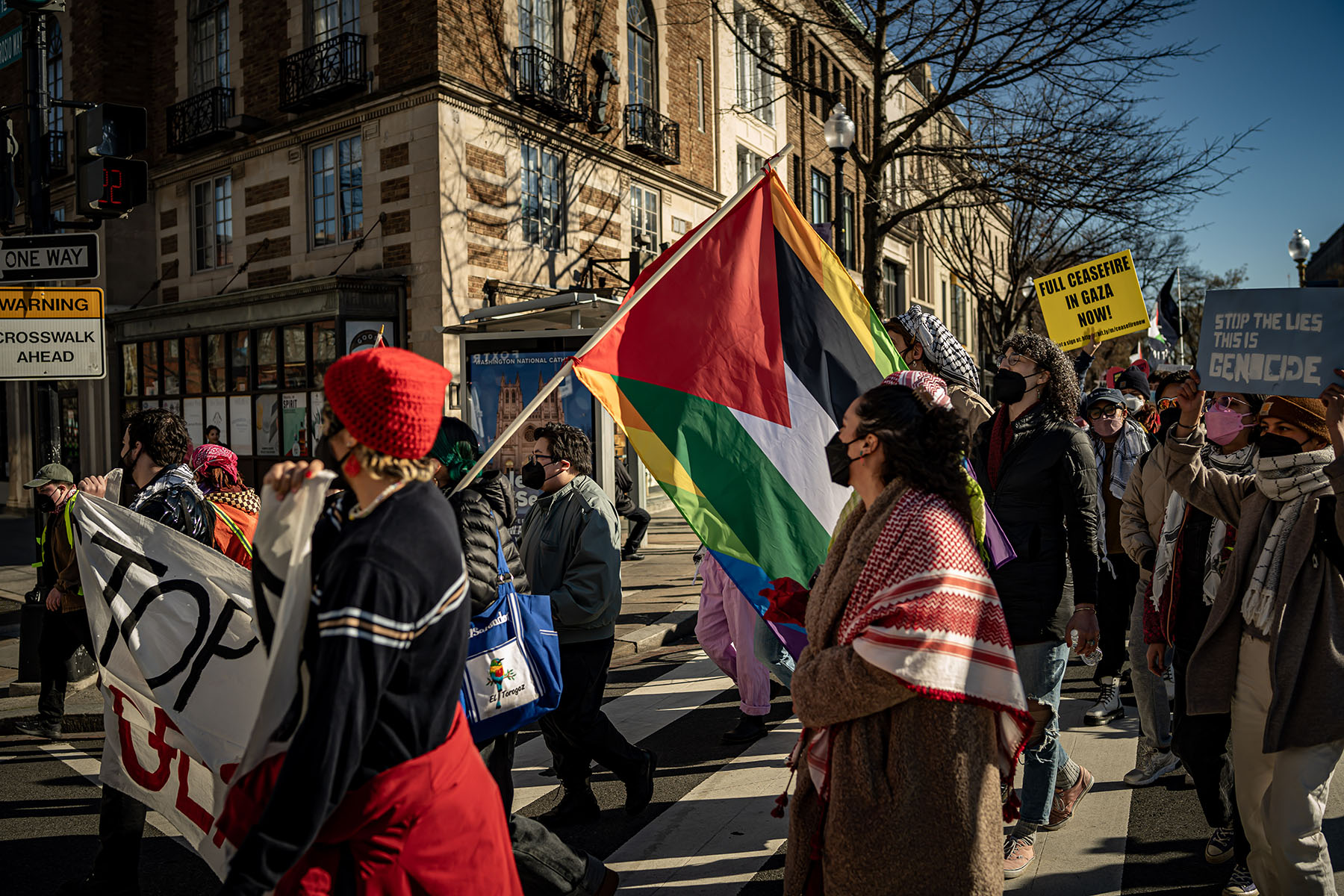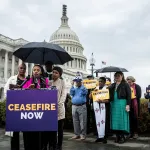Thousands of LGBTQ+ Americans are denouncing Israel’s military offense in Gaza as an act of genocide and calling for a permanent cease-fire by signing online petitions, sending email campaigns and protesting at events in Washington and New York. They want national organizations that mobilize on LGBTQ+ civil rights to do the same — but so far, these organizations have not taken a clear public stance.
Queer advocates calling for a cease-fire say LGBTQ+ groups have a responsibility to denounce the use of “pinkwashing,” or what they allege as the Israeli government’s attempts to hide human rights violations behind a purportedly pro-LGBTQ+ image.
Although the Biden administration recently called for a six-week cease-fire and an increase in humanitarian aid, a permanent cease-fire is the ultimate goal of pro-Palestinian advocates; and they want LGBTQ+ organizations to lend their influence to the cause.
The Israel-Hamas war, the deadliest conflict in the region, began in October in response to a Hamas attack that left more than a thousand Israelis dead and injured, and hundreds of others taken hostage. Since then, over 30,000 Palestinians have been killed amid Israel’s military bombardments, while hundreds of thousands of others face famine and starvation during the humanitarian crisis in Gaza. Millions have been forced to flee their homes.
The United Nations’ International Court of Justice has ordered Israel to take all possible measures to prevent genocide and to follow through on other measures to curb mass suffering; the court did not demand a cease-fire. Since that January ruling, civil rights groups Human Rights Watch and Amnesty International have accused Israel of defying the court’s legally-binding order. South Africa brought the initial case to the UN Court accusing Israel of genocide in Gaza.
On Valentine’s Day, over a hundred people in Washington, D.C. protested outside the national headquarters of the Human Rights Campaign (HRC), the largest LGBTQ+ organization in the country. Demonstrators called on the HRC to “break their silence” on the mass deaths of Palestinians and to denounce the use of any rhetoric involving LGBTQ+ identity to justify the violence.
The protest in Washington was led by a coalition of queer and transgender Muslim and Jewish people, as well as LGBTQ+ Arabic, Southwest Asian and North African people, titled “No Pride in Genocide.” It followed a similar protest earlier in February outside the HRC’s annual gala in New York City, which organizers with “No Pride in Genocide” said was not orchestrated by their group. Indya Moore, star of the award-winning LGBTQ+ television show “Pose,” joined that New York protest on February 3, saying that queer and trans Palestinians deserve a human rights campaign on their behalf.
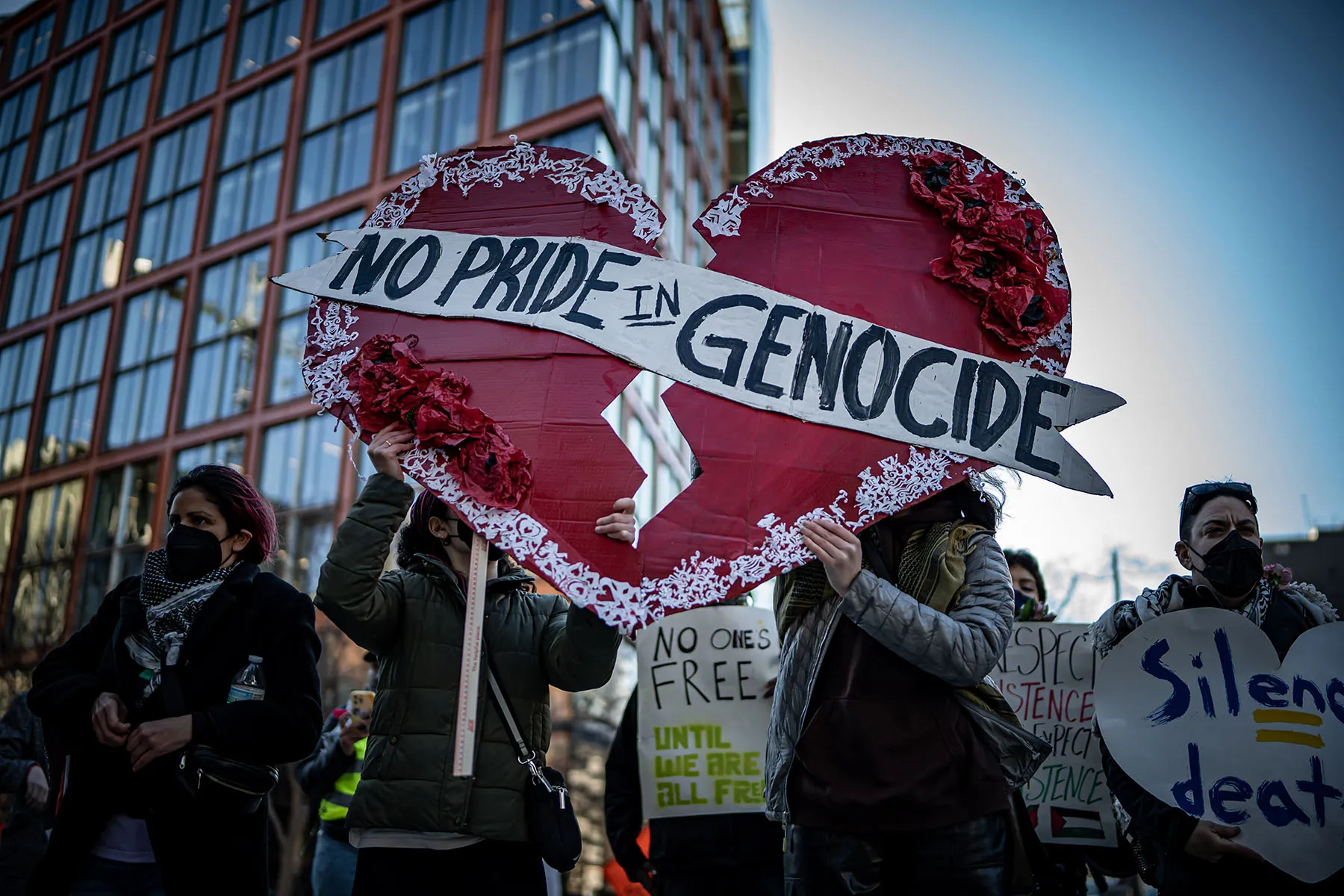
“The Human Rights Campaign is mobilizing our community and our allies to support their initiatives because they believe their initiatives are in our best interest. However, these initiatives that are meant to benefit us, are being funded by a weapons manufacturer,” Moore told the crowd, referring to Northrop Grumman, a major defense contractor. “Not cute, not queer. You cannot aid liberation by taking someone else’s.”
Protesters in D.C. called on the HRC to sever ties with donors like Northrop Grumman as the United States continues to send millions of dollars worth of weapons and aid to Israel.
When asked how the organization is responding to recent protests, the Human Rights Campaign directed The 19th to a webpage published on Feb. 29, of public statements from HRC President Kelley Robinson on “the humanitarian crisis in the Middle East.”
On this page, the organization says that it “will continue to speak out against this violence.” The webpage also includes 13 public statements from Robinson, in which she denounces the Hamas attack as well as the killing of Palestinians and decries the lack of access to humanitarian aid that Palestinians have endured.
“There have also been questions regarding corporate support for our work. The Human Rights Campaign receives funding from a wide range of grants, individuals, and organizations. We want to be clear: our funding never changes our mission,” the webpage says.
A Human Rights Campaign employee, who spoke on condition of anonymity to discuss internal conversations at the organization, and out of fear of retaliation from others in the LGBTQ+ movement, argued that the HRC can have the most impact during a time of tremendous stress for LGBTQ+ people by focusing on domestic issues, like anti-LGBTQ+ state policies. In her view, the HRC’s input on the Israel-Hamas war would have a low chance of changing anything.
However, the organization has not been ignoring the issue internally. HRC has held multiple all-staff meetings for employees to share their views on the ongoing violence, she said, and some staff have demanded action — while others feel unsafe to share their perspectives.
Demonstrators have also called for the HRC and for other major LGBTQ+ groups like the Trevor Project, an LGBTQ+ youth crisis organization, and GLAAD, the nation’s largest LGBTQ+ media advocacy group — neither of which responded to requests for comment — to denounce the use of “pinkwashing” to justify attacks on Gaza.
Sa’ed Atshan, a professor of peace and conflict studies at Swarthmore College, in his book “Queer Palestine and the Empire of Critique,” defines “pinkwashing” as the term that queer Palestinian activists use to describe how Israel incentivizes attention as a pro-LGBTQ+ state while detracting attention from its violations of Palestinian human rights.
Israeli Prime Minister Benjamin Netanyahu described the war in November as “a battle of the forces of civilization against the forces of barbarism,” portraying Israel as a defender of democracy in the Middle East. One of those democratic values that Israel has worked to emphasize, before the current conflict as well as during it, is its recognition of LGBTQ+ people. Israel embraces gay tourists, however same-sex marriage is not legal — and its current far-right government has sparked fear in Israel’s LGBTQ+ community.
In Gaza, LGBTQ+ people live under the threat of persecution and violence for their identity. Specific acts of violence, like a former Hamas commander being executed for his homosexuality in 2016 and the 2022 killing of a young gay Palestinian, underscore the conditions that LGBTQ+ Palestinians have faced in Gaza under Hamas, which has ruled the area since 2007.
However, LGBTQ+ Palestinians threatened due to their sexual orientation were unable to seek asylum in Israel until February this year. In 2021, when LGBTQ+ Palestinians who fled Gaza or the West Bank were still denied work permits and medical care by Israel, the apparent suicide of a transgender woman in Haifa sparked public outcry on the lack of basic rights for LGBTQ+ Palestinians within Israel.
For LGBTQ+ Palestinians, advocates say the bigger picture is that they are more likely to die from being bombed by Israel than for their queer identity.
“Last time I checked, weapons can’t tell the difference between queers and straights — and bombs kill us all!” Firas Nasr, a nonbinary Lebanese organizer living in Washington, said in a press release following the Valentine’s Day protest.
To Nasr, an obvious example of pinkwashing is a photo of an Israeli soldier holding a Pride flag amid the rubble and bombed ruin of Gaza. Israeli government spokesperson Eylon Levy shared the photo on X, the platform formerly known as Twitter, in November with the caption: “The closest Gaza has ever come to a Pride March.”
“That photo in itself is a manifestation of a years-long campaign to create the sense that Israel is actually defending queer and trans rights and lives by committing these atrocities,” Nasr said in an interview. “That’s why it’s so critical to draw home that this is happening in our name.”
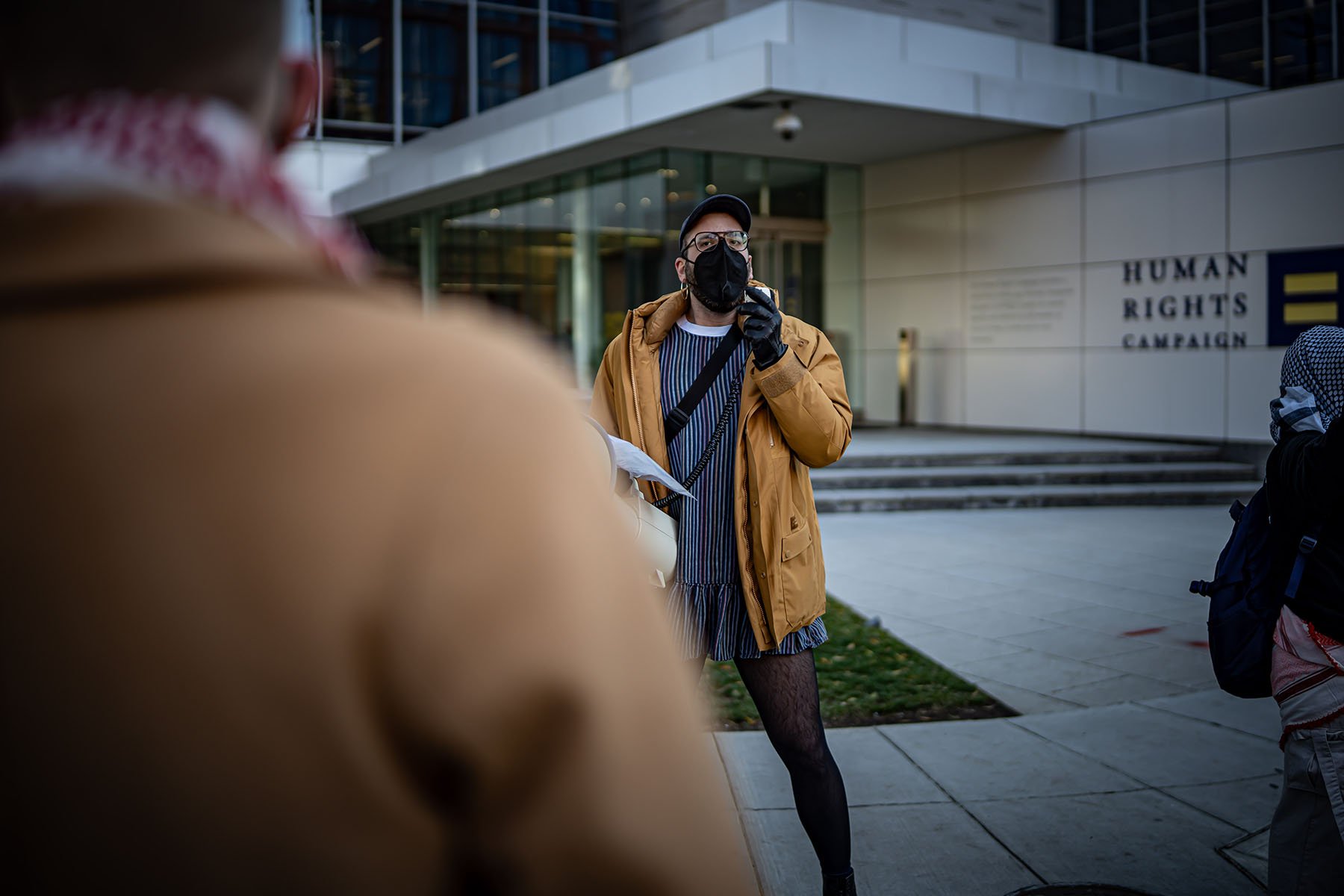
In an interview with Business Insider, Yoav Atzmoni — the Israeli soldier who shared the photo, as well as another photo of himself holding an Israeli flag emblazoned with rainbows in front of a tank — framed the war as an effort to protect LGBTQ+ rights and democracy in the region. He called out the persecution of LGBTQ+ people in Egypt and Jordan as part of his reasoning.
Israel’s official X account, which is run by Israel’s ministry of foreign affairs, shared another photo in December of a man proposing to his partner, a soldier in the Israel Defense Forces, with a ring meant to honor those killed on the Oct. 7 Hamas attack — despite the lack of legal recognition for their relationship.
One D.C.-based organizer with “No Pride in Genocide,” a queer Palestinian woman who asked to remain anonymous out of concerns over being doxxed, said that she sees pinkwashing rhetoric as an effort to keep her identities separate. But fighting for queer liberation and Palestinian liberation are one and the same, she said, just as her identities are.
She loves her Arab and Muslim culture, she said, as much as she loves her queer identity. Her family primarily lives in Jordan and Egypt, she said, in addition to some distant relatives in the Israeli-occupied West Bank — who have long faced intimidation tactics, especially within “dehumanizing” military checkpoints. She wants to show the world that queer Palestinians exist.
“To defend a genocide, they have to say, ‘oh you wouldn’t be safe there as a queer person.’ How are you protecting me by bombing innocent human beings? To claim that Israel is this safe haven for queer people when there is so much homophobia and transphobia, even within Israel or the U.S., is incredibly hypocritical,” she said. “I’m consistently told that I should be okay with the genocide of my people, because I’m queer.”
Queer and trans people want LGBTQ+ organizations to actually represent their voices, she said — and if these groups don’t do that, they will find other ways to make their voices heard.
The Valentine’s Day protest in Washington was the first for “No Pride in Genocide,” Nasr said. Since then, the group has helped LGBTQ+ people protest in Detroit, Reno, and Los Angeles by sharing protest details on Instagram and online resources for gathering. The group has also spread awareness of demonstrations by groups like ACT UP New York, the AIDS activist movement that was instrumental in securing medical rights for LGBTQ+ people during the AIDS crisis. ACT UP has also demanded that the HRC stop accepting philanthropy from Northrop Grumman.
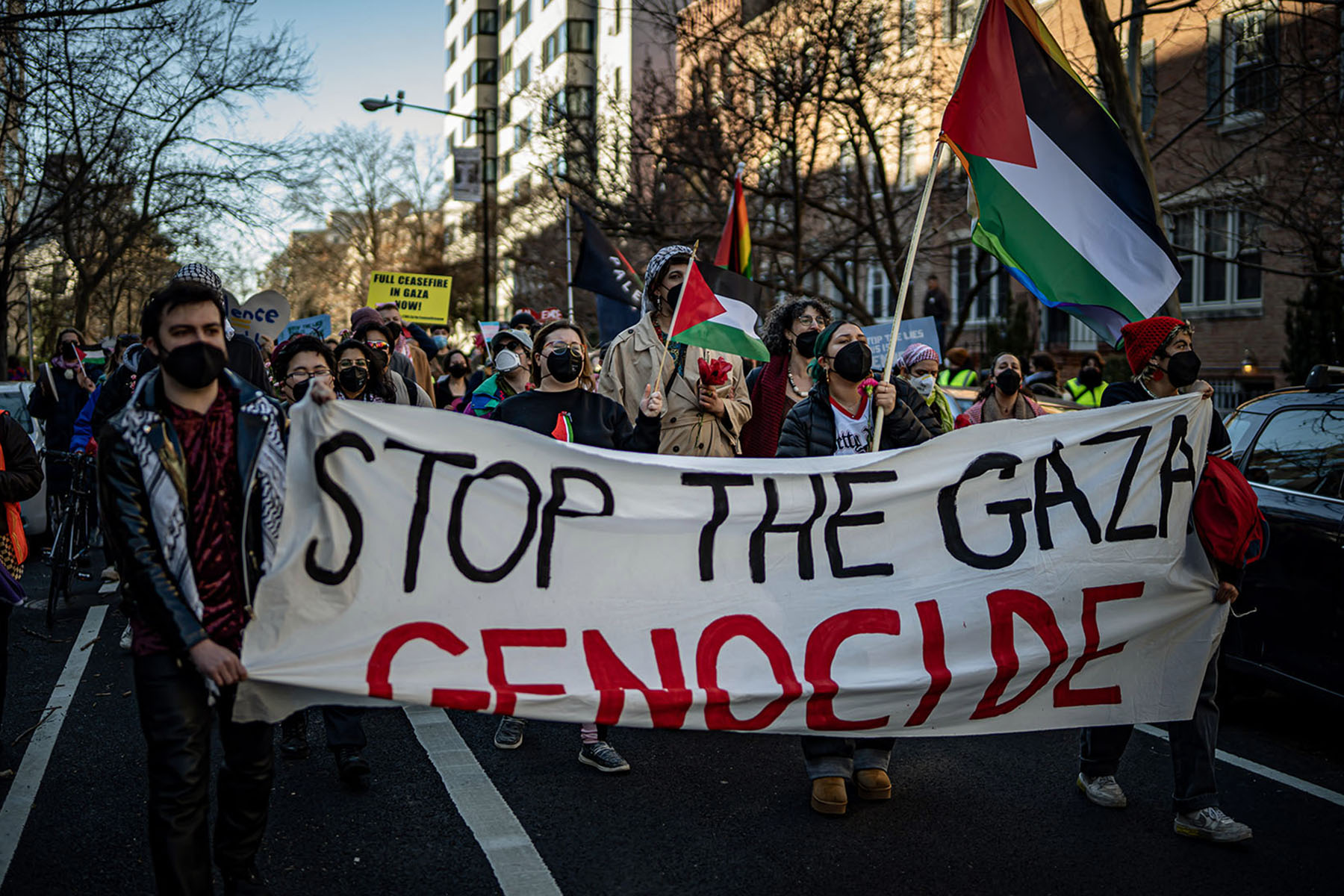
Online, roughly 28,000 people have signed a petition made by the group “Queers for Liberation” that calls on national LGBTQ+ advocacy organizations to publicly support an immediate cease-fire, to pressure officials to end U.S. aid to Israel and to “use their influence to end the ongoing violence.”
“We condemn the Israeli Occupation Force (IOF) for deceptive ‘pinkwashing,’ using LGBTQIA2S+ symbols to divert attention from their actions. LGBTQIA2S+ organizations must denounce this and reject neutrality in the face of genocide,” the petition reads.
Benjamin Kersten, an organizer with the UCLA and Los Angeles chapters of Jewish Voice for Peace, is one of the many students across college campuses to raise their voice to support Gaza. Many other students have spoken out in support of Israel — and students all over the country are organizing amid increasing Islamophobic and antisemitic attacks at schools.
For Kersten, their queer identity has directly informed their political views, including their support for Palestinians.
“For me, it opened my eyes in a whole new way to understanding dynamics of power, and especially dynamics of state power, because all of a sudden, you see yourself as part of this collective of people who have in some way been deemed something less than human,” they told The 19th in a November interview, referring to their queer identity.
Kersten, a PhD candidate studying art history at UCLA, said that the presentation of Israel as a liberal safe haven, including for queer people, is false. To him, Israel is built on the occupation of its Indigenous people. Criticizing Israel does not equate to antisemitism, he said, and as a Jewish person, it’s been difficult for him to understand why some politicians and advocates have labeled pro-Palestinian protests as supporting terrorists.
“If you’re someone who says ‘all Jews support Israel,’ that’s actually making an assumption that all Jews are deeply the same in some way,” Kersten said.
Back in October, following the Hamas attack that left around 1,200 Israelis dead and hundreds of others taken hostage, the president of the HRC shared a statement on what the group described as “the ongoing violence in the Middle East.” Robinson said that as a Black queer woman, she understands the anguish of being part of a community that is repeatedly targeted, while referring to the suffering of Israeli and Palestinian civilians.
“I can’t begin to fully grasp what this moment of crisis must feel like for those who are Jewish. I can’t fully understand what it must feel like to be an Israeli or Palestinian civilian right now,” she said. “I am outraged by the brutal terrorist attack by Hamas, killing 1,200 Israeli civilians. The toll on both Israeli and Palestinian civilian lives rises daily. And many in the United States who are Jewish and Muslim recognize that hate-motivated bias and violence will rise here. Antisemitism is wrong. Islamophobia is wrong. Full stop,” she said last year.
“This violence is a reminder that the struggle for liberation against extremism, discrimination, and hate is a global struggle. It’s my struggle. It’s your struggle. It’s our struggle,” Robinson said.
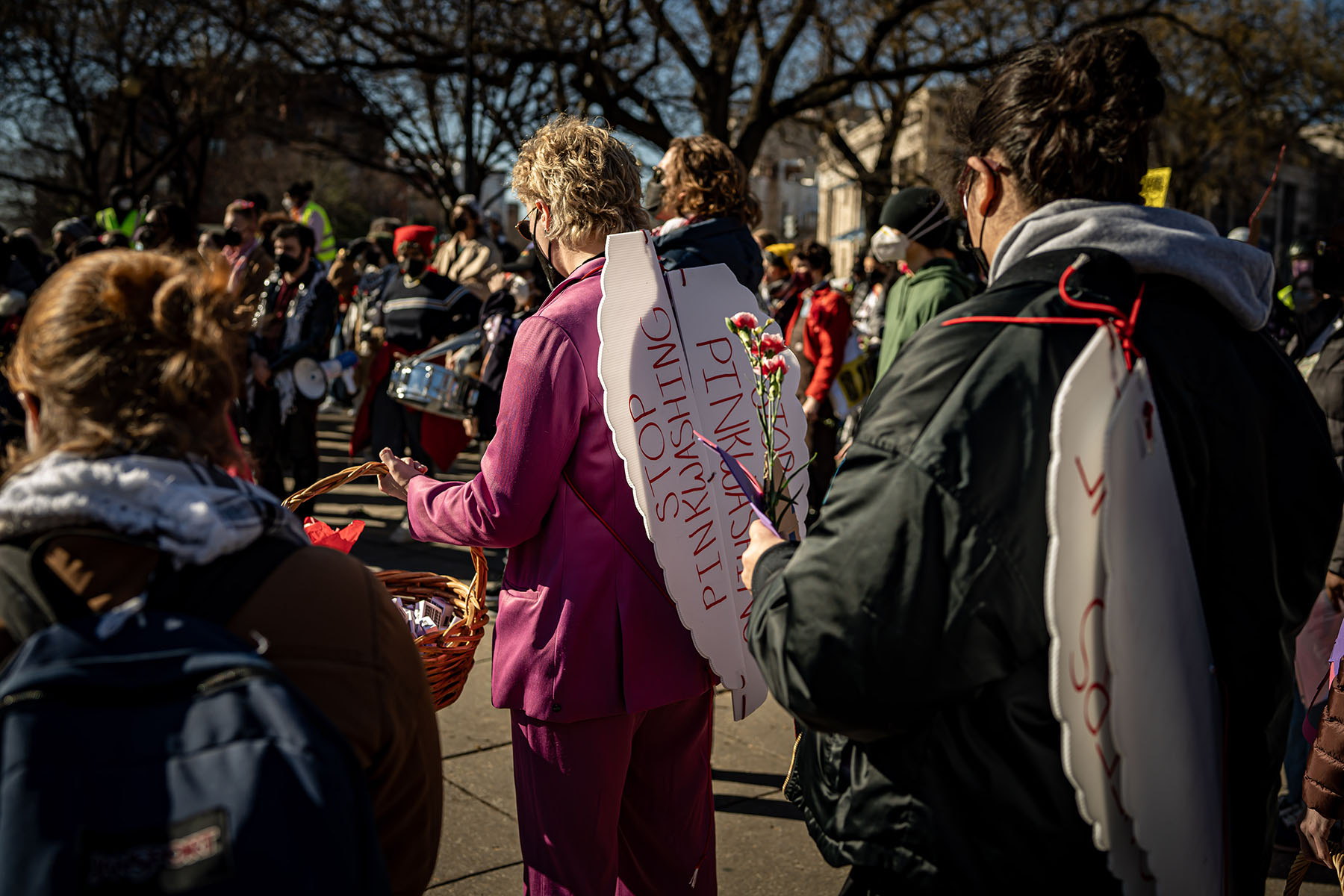
Also in October, GLAAD released a statement sharing the sentiment against rising antisemitism and Islamophobia in the aftermath of the October 7 Hamas attack.
“Our hearts break for all those impacted by terrorism, for the loss of civilian lives in Gaza and Israel, and for all innocent people who live in fear because of who they are,” said GLAAD’s statement.
“Globally, there is also a dangerous rise in anti-LGBTQ hatred, racism, and anti-immigrant sentiment. … LGBTQ people live in every culture and every society, and GLAAD will continue to urge safety for our community and all of the innocent civilians caught in the middle of this unfolding violent conflict,” the statement says.
Nadra Nittle contributed reporting.
Disclosure: The Human Rights Campaign has been a financial supporter of The 19th.
